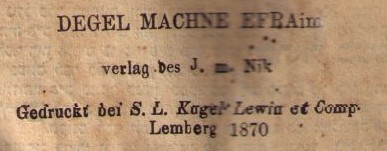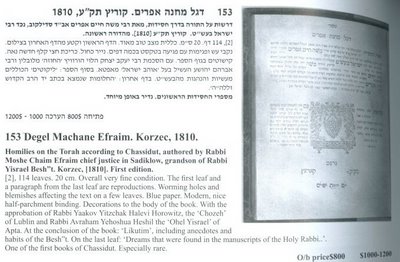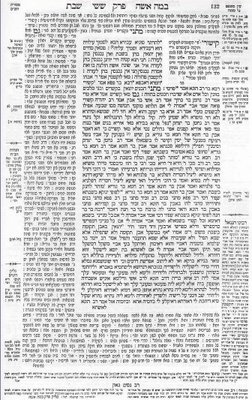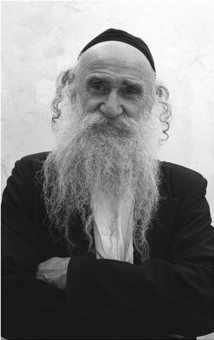A Simple Jew
אַשְׂכִּילָה בְּדֶרֶךְ תָּמִים
Friday, June 30, 2006
Kabbalah & Chassidus
Anyone who has studied Chassidus, such as Toldos Yaakov Yosef, Meor VaShemesh, Tanya, Kedushas Levi, knows that the Zohar and Kabbalah are often quoted. Should a person shy away from these teachings too? Definitely not! The Codifiers - Beis Yosef, RaMa, Magen Avraham, Taz, Shakh, Mishnah Berurah and so on, all quote the Zohar and the writings of the Ari. So do many other authors of works on the Revealed Torah. The warnings against studying Kabbalah, for those not worthy, refer to a straight and analytical study of a basic Kabbalah text. They do not apply to short passages quoted in other works.
(Rabbi Zvi Aryeh Rosenfeld)
Thursday, June 29, 2006
"Why should the nations say, "Where is their G-d?" Let it be known among the nations before our eyes the revenge of the spilt blood of Your servants." - Tehillim 79:10
Drop a few coins in your pushka and say this kapitel of Tehillim in the zechus of Cpl. Gilad Shalit.
May the Ribbono shel Olam prevent any harm from coming to Gilad ben Aviva, and may he be returned safely to his family. May the Ribbono shel Olam avenge the blood of Eliahu Pinchas ben Miriam.
Pidyon Shevuyim
Excerpt taken from Inner.org:
Rabbi Menachem Nachum of Chernobyl dedicated much of his life's work to redeeming imprisoned Jews. In those days, if a Jew could not pay his debts to the local landlord, he was often thrown mercilessly into a dungeon or pit, sometimes with his entire family. Rabbi Nachum raised money to redeem these unfortunate Jews, saving them from sure death. Our sages say that there are two commandments that are called "great mitzvot." The first is the commandment to procreate, and the second is the commandment to redeem imprisoned Jews. When one redeems a Jew, thereby saving his life, it is as if he given birth to his soul.
It came to pass that Rabbi Nachum was also imprisoned. Daily he would bribe the prison warden to let him out of the pit for a short time to pray and to immerse in the mikveh. One day, Rabbi Nachum did not bribe the warden. He explained that he did not need to do so, for he would be released from prison on that very day. When asked how he knew that he would be released, he related that on that night Sarah had come to him in a dream. Rabbi Nachum asked Sarah what he did to deserve being thrown into a pit. Sarah answered that because Rabbi Nachum had devoted his life to redeeming captives, it was necessary for him to experience a taste of captivity so that he could consummately understand the situation and subsequently devote himself to this mitzvah in an even more rectified manner. When a person understands why God has involved him in a certain situation, this releases him from the situation. Thus, as soon as Rabbi Nachum understood the reason for his imprisonment, he knew that he would be released on that very day.
First Day Of Summer Camp
This Summer my three year-old daughter is going to camp for the first time.
For the past few weeks she nervously anticipated her first day and constantly inquired about who would be picking her up, what color van she would be riding in, who her counselor would be, where the camp would be located, and what kind of arts and crafts she would be able to do. A few days before camp started, she broke down crying. I drove her over to show her the large blue passenger van that would be picking her up each morning and explained to her that I too was nervous before the first day of camp when I was a little boy.
On Sunday evening, we attended an orientation BBQ and she had the opportunity to meet her counselors for the first time. Even this, however, did not seemed to calm her fears and before she went to bed that night she very nervous for the next day.
On Monday morning before the van picked her up at 8:45 she was screaming and crying that she did not want to go. My wife took her outside and gave her a candy necklace while they waited. And, what do you know.....it worked. She got into the van willingly, and without a fuss.
She came home from her first day at camp and was absolutely esctatic; for two hours straight she went on and on and on about all the things they got to do. Before she went to bed she told us, "I get to go to camp again tomorrow!"
 (Image courtesy of Camp Gan Israel)
(Image courtesy of Camp Gan Israel)Victim vs. Aggressor
Let a person always prefer to be abused than be abusive, for there are no birds more preyed upon than the pigeon and the dove, and yet they are the only birds acceptable as korbanos on the mizbeach.
(Talmud - Bava Kamma 93a)
Wednesday, June 28, 2006
Popped Into My Inbox

Last Thursday morning, an e-mail from a antique book dealer in Jerusalem popped into my inbox. The e-mail simply read:
Degel Mahane Efraim Lemberg 1870
I immediately replied to the e-mail inquiring about the sefer's condition and price. Upon receiving the response, I sent payment via Paypal. Four days later, I received another e-mail from a dealer in Brooklyn offering the 1947 New York printing of Degel Machaneh Ephraim. Needless to say, I purchased this printing as well.
Now, I eagerly await their arrival. They will be welcome additions to my collection.
Perhaps one day I will even be able to acquire this:

Even The Smallest Movement
Even if you are incredibly far from G-d and think that your every action is an insult to Him, know that each movement you make to extricate yourself from your physicality is extremely precious to Him. With the smallest movement in this world, one traverses thousands of miles in the supernal worlds.
(Otzar HaYirah, Hischazkus 33)
Tuesday, June 27, 2006
Question & Answer With Rabbi Lazer Brody - World Pride 2006
A Simple Jew asks:
I am obviously against the World Pride 2006 march in Jerusalem. During Disengagement you advocated that everyone take it upon themselves to say Perek Shira as means to nullify the evil decree. You maintained that people should not take part in demonstrations against Disengagement; that it was a spiritual battle, not a physical one.
Now, it appears that you are advocating that in addition to our prayers, we lobby politicians and other influential figures as a means to stop the march.
Why is this struggle any different than the struggle against the decree of Disengagement? If Hashem runs the world, why do we need to send even one e-mail or fax?
Rabbi Lazer Brody answers:
Good question, SJ. If we had 20,000 people doing an hour of hitbodedut a day, then would wouldn't have to write a single letter, for this is a spiritual battle too. Rebbe Nachman of Breslev explains that where you don't have emuna, you have to exert a lot of energy in Hishtadlut.
During the pre-disengagement period, Rabbi Shalom Arush and I were speaking to every possible forum that would listen, urging round-the-clock hitbodedut. We were sure that people would prefer an hour of personal prayer a day to losing their homes. Yet, the demonstrations attracted thousands of people, whereas few were seriously talking to Hashem every day up in the hills and down on the beach.
When I saw that the call to hibodedut wasn't being answered, I watered it down to Perek Shira, which only takes 10-12 minutes a day. More committed, but the number didn't exceed 1000.
Hashem is repeatedly testing our emuna. He wants tshuva and prayer more than letter-writing. But, when we see that people lack the emuna to win the battle with the weapon of prayer, we should at least mobilize them in a letter-writing campaign. The virtues of letter writing is that it has already pulled more than 30,000 Jews together in unity, and even those who are not observant are answering the call of loyalty to Hashem and to Jerusalem - this is a great achievement.
Yesterday, The Melitzer Rebbe shlit'a, Rav Shalom Arush shlit'a, and I were in Miron, saying our prayers at Rebbe Shimon bar Yochai's gravesite. Prayer is what I personally believe in. But, this time, I received a direct order from the Melitzer Rebbe to mobilize at least 20,000 other people to protest against Impurade 2006. The Melitzer Rebbe is the one who ordered the letter-writing campaign.
Rebbe Nachman of Breslev says that the sword of Moshiach will be prayer, and with that, he'll conquer the world. But, those of us on a lower level, still need conventional weapons.
--
Letters protesting World Pride 2006 can be sent to Eliahu Yishai (MK - Shas) at: eyishay@knesset.gov.il
Faxs can be sent to:
Jerusalem Police: [USA] 011 972-2-5391391, world wide +972-2-5391391
The Gerrer Rebbe: [USA] 011 972-2-5388774, world wide +972-2-5388774
* The Gerrer Rebbe shlit'a is one of the Jewish religious leaders of this generation in Israel, he can awaken the religious majority of Jerusalem to public action (and merely the statement that he is considering it would have tremendous impact).
Attached To The Pure
My grandfather, the Yehudi Hakodesh of Pshyscha zt"l, was known to quote the Mishnah (Keilim 12:2), "All that is attached to the pure is itself pure." His disciple, Rebbe Simcha Bunim once commented that this seemed unfair. Why is it that the tzaddik must struggle his entire life to purify himself, whilst his disciple can simply attach himself, and thereby achieve the same purity? The Yehudi Hakodesh answered that to be attached to a pure tzaddik is often more difficult than becoming pure oneself.
(Biala Rebbe)
Monday, June 26, 2006
Question & Answer With Akiva of Mystical Paths - Luchos & Daughters
A Simple Jew asked:
It is known that Moshe Rabbeinu ascended Har Sinai on the 2nd of Sivan in order to receive the first set of luchos from Hashem. Moshe ascended again on the 1st of Elul to receive the second set of luchos.
My first daughter was born on 1 Elul and my second daughter was born on 2 Sivan. Do you believe there is a connection between Moshe's ascent to bring down the luchos and the birth of my daughters, or I am reading to much into this?
Akiva of Mystical Paths responded:
Mazel Tov! The birth of a child in good time and in good health always brings us to great hope for the future, may you lead them to Torah, Chuppah, and Ma'asim Tovim!
It's natural for parents to look for positive signs in their childrens birth. The 6th Lubavitcher Rebbe said, we should live with the times. This he explained to mean, we should live with the Torah portion of the week! (And bring it in to our lives and tie the events of our week to it.)
In this realm, it's a very common Jewish custom for some parents to name their children when their birth comes out during a particular holiday season (such as Ester or Mordechai around Purim, or Pesach, Aviva, or Eliyahu around Passover). Among chassidim, if a child is born on the very auspicious times of a tzaddik's hilhula or birthday, the child may be named for the tzaddik (such as Yisroel on the 18th of Elul, for Rabbi Israel the Baal Shem Tov or Shneur Zalman for the Baal HaTanya, also born on the 18th of Elul).
Further, many events are considered to have occurred when they did because it was an auspicious time for such an event, meaning there was a certain mazel at that time for that event. And of course, a mazel for a person is dependent on the day of birth.
So I would say your daughters were born at very auspicious times and indeed their mazel is related to the events of the luchos.
A Simple Jew asked:
What do you think it is in particular that connects my daughters to the events related to the luchos? Do you think that their birth on these dates is symbolic of the fact that they are responsible to bring down the Torah to a new generation by giving birth to Jewish children (G-d willing)?
Akiva of Mystical Paths responded:
I wish I had the wisdom and vision to truly discern it. However, at best I can only speculate.
As we are, G-d willing, mere moments away from the revelation of Moshiach, every neshoma must be given its opportunity in this world, or it's last opportunity to repair previous breaches.
At this stage of their lives, your little daughters opportunity is to live in a kosher environment, as provided by you and your wife. They also have the zechut of their parents mitzvos invoke because of them (naming at the Torah, teaching them brachos, emunah, saying Shema with them, chinuch).
Later in their lives (if, G-d forbid, Moshiach has not yet come) their mazel will shine through, and perhaps you will notice a special level of exactness in committment to Torah and mitzvot, or a special level of connection to Hashem, in association with the mazel of the special days of the giving of the luchos.
Heichal Hanegina announces a new e-mail group dedicated to the Torah, Negina and Heritage of Modzitz.
The Evil Eye
Hide yourself from public scrutiny, for their is nothing more destructive than the ayin hora (evil eye). The first luchos were accompanied by earth-shaking thunder, and therefore the ayin hora reigned and the luchos were shattered. The second time Hashem gave Moshe the luchos, He instructed Moshe to ascend Har Sinai discretely, along and without fanfare, therefore the luchos endured.
(Yalkut Shimoni 148)
Sunday, June 25, 2006
Friday, June 23, 2006
Guest Posting From Chabakuk Elisha - A Soft Spot For The Meraglim
In Parshas Behalosecha, the Chumash gives us an interesting chain of events:
- Klal Yisroel complains about the Manna.
- Moshe tells Hashem that it's too much for one man to handle.
- Eldad & Meidad prophesize.
- Yehoshua is upset about Eldad & Meidad's prophesy.
- Moshe silences Yehoshua's indignation.
- Miram tells Aharon lashon hora about Moshe and refers to his relationship with the dark skinned woman.
- Hashem sends tzoraas for speaking ill of Moshe.
And, of course, parshas Shelach is closely linked to Parshas Behalosecha. In Parshas Shelach, Kalev speaks in defense of Israel, and Yehoshua takes a secondary role, although (at first glance) it would seem that Yehosha should have been the more outspoken of the two. At that time, Klal Yisroel stands ready to enter Eretz Yisroel, and their avoda's focus will change from pure spirituality to one incorporating physicality by working the land (the ultimate fulfillment of G-d's will). This transition will indeed be difficult for everyone, and on more than one level.
What was Eldad and Meidad's prophesy? We are told that they prophesized that Moshe will not be joining them while they make this transition; Moshe will not enter Eretz Yisroel. Obviously, this creates uproar since losing Moshe is unfathomable. Yehoshua is greatly disturbed by the news, but Moshe lets him know that he must live with reality and prepare for leadership when it comes time.
Miriam and Aharon also don't understand why Moshe cannot come with the people, and they speculate that perhaps it is because the Holy Land cannot tolerate Moshe having married a non-Jewish Ethiopian princess while he spent time there as their king. Hashem tells Miriam that Moshe is the greatest of all men and that he experiences prophesy like no other – his sanctity is beyond all men. Hashem tells Miriam that it is she has it backwards…it is the Land of Israel that is ashamed before Moshe.
And Yehoshua? Why doesn't he stand up before the meraglim and their evil report? Why does he leave this responsibility to Kalev?
Because, if I may be so bold as to suspect, Yehoshua has a soft spot for the deeper intention of the meraglim. If they are about to enter Eretz Yisroel, then Moshe will die – as Eldad and Meidad prophesied – and Yehoshua will become the leader. On one level, he does not stand up before the meraglim because it will appear that his ambition is solely to attain power for himself. Thus he keeps a low profile; he's not asking for this promotion. Moreover, as the ultimate chossid of his Rebbe, he understands that if they don't enter Eretz Yisroel at this time they won't lose Moshe.
How does G-d "punish" Klal Yisroel for the sin of the Meraglim? Perhaps we can say that Hashem gives in. He realizes that the Yidden aren't yet ready - therefore, he gives them what they want: They get to stay with Moshe for an extra 40 years…
Shaming Another
One who shames another in public has no place in the World to Come.
(Talmud - Bava Metzia 59b)
Thursday, June 22, 2006
The Muqata: Amazing Midnight Visit to Kever Yehoshua bin Nun
The Condition
Excerpt from "The Reward of the Righteous Women":
The story is told of a chassid who would occasionally leave his family to travel to the Bnei Yissachar zt"l. His wife would protest at the great difficulty of being left alone to care for their many young children. Once, upon discussing an upcoming trip, she agreed to let him go on condition that he promise her half of his reward for the mitzvah of visiting the Rebbe, and that he inform the Rebbe of their agreement.
When the chassid told the Rebbe of the condition he had made with his wife, the Rebbe scolded him. "Fool! You should have asked her for half of her reward, which is far greater than your own. She is the one left behind to care for the children, a most difficult and thankless task. You on the other hand, have a thoroughly enjoyable time here, experiencing the spiritual delights of being with your Rebbe and the other chassidim. You see therefore, that her reward is greater than yours."
Mitzvah Mathematics
G-d does not accept mitzvos as bribes. For instance, the Holy One, Blessed is He, does not say, "He has fulfilled forty mitzvos and committed ten aveiros; thus, the reward of thirty mitzvos remains, for ten are deducted for the ten aveiros." G-d forbid! Rather, if even a perfectly righteous individual commits a single aveira, it is considered to Hashem as if he burned the Torah scroll - until he appeases Hashem for his guilt, after which he will receive reward for all his mitzvos. This is a great kindness that the Holy One, Blessed is He, does for the righteous. He does not deduct from their mitzvos, for mitzvos are very precious and ascend until they come before His blessed Presence.
(Tomer Devorah, Perek Aleph)
Wednesday, June 21, 2006
Question & Answer With Yoni Lipshutz of Simply Tsfat - Rabenu's Niggun
The recording of "Rabenu's Niggun " on your CD "New Beginnings" brought tears to my eyes the first time I listened to it. Your violin playing for this niggun touches my neshoma in a very deep place like no other niggun does. Just recently I listened to it again and tears welled up in my eyes and I found myself crying once again.
What is it about that niggun that makes it so powerful?
Yoni Lipshutz of Simply Tsfat responds:
I don't know what to answer regarding Rabbenu's niggun. I hear that the connection is deep. Here are some dis-jointed thoughts:
We sing the niggun at most Breslover weddings and always at the 3rd meal on Shabbos before Rav Kenig, shlita, of Tsfat gives over a teaching, usually from Lekutai Mohoran. This is one of only a few niggunim directly attributed to the Rebbe himself. Rabbi Nachman (some say also the Koztker Rebbe) say that there is nothing more whole than a Yid with a broken heart. Perhaps when you listen to it, you are receiving a shefa, a divine influx from above, an accumulation of all those weddings and 3rd meals, a direct connection to what ever the Rebbe himself connected to when he brought it down.
Our mother Rachel was not buried in Hevron with all the Avot (fathers) and Imaot (mothers) of the Jewish nation, but rather on the way to Galus. Why? When the Yidden davened by all the Avot and Imaot, HaShem did not listen to their prayers or even to the prayers of the Avot and Imaot! Only when they davened by Rachel and Rachel cried to HaShem, did HaShem say that in her merit He would end the Galus. What was her merit? In Hebrew, she was "mivater", she "gave in" and stepped aside for her sister Leah. So too, when we ourselves "give in" and make someone else's suffering a priority above our own, do we merit Geula. So, keep those tears flowing, and while they are, ask HaShem with great yearning and simcha for an end to the golus and for shlaimus for ALL Am Yisroel!!
 Simply Tsfat
Simply Tsfat(Photograph courtesy of Simply Tsfat.com)
A Courtyard
A courtyard comes before the house and guards it. You enter the courtyard first, representing faith. Afterwards, you enter the house, representing wisdom.
(Otzar HaYirah, Bayis v'Chutz 18)
The Hasidic Niggun As Sung By The Hasidim

Last week, I bought a copy of the CD "'The Hasidic Niggun As Sung By The Hasidim" after reading my friend Hirshel Tzig's posting. Although I am familiar and enjoy the niggunim of Chabad and Breslov, I was surprised to discover upon listening to it for the first time last night that I also connected with the niggunim of Vizhnitz.
My favorite tracks on this CD are:
Disk 1
5 - Two dance niggunim of Vizhnitz Hasidim
7 - Berl's Niggun
20 - Medley of "Meron tunes"
Disk 2
6 - Niggun of the Maggid of Mezhirech
7 - Yearning niggun
12 - Ki hinneh kahomer
17 - "Varshever marsh"
--
Note: I was also interested to read in the liner notes that the yahrzeit of the third Vizhnitzer Rebbe, Rebbe Yisroel Hager (the Ahavas Yisroel) is 2 Sivan; my newborn daughter's birthday.
Tuesday, June 20, 2006
Another Shtetl Mystery: Two Versions Of A Story
 Sudilkov's Shul
Sudilkov's ShulA tale is told by Rabbi Leib of Letichev of a special "protection" that the Degel Machaneh Ephraim, while still a boy, received from his holy grandfather [the Baal Shem Tov]. The story is as follows. Once when the Degel was sitting near the pure table of his holy grandfather, his grandfather said to him, "If you like, I will show you something." "Oh, yes," answered the Degel, the little grandson. Immediately the holy Besht ordered that he be brought a piece of parchment which he placed under the tablecloth for a while, while he was engrossed in holy thoughts. Afterwards he took it out from under the table, and found written on it, "Ani Mem-Tes-Tes Sar HaPnim". The Besht then gave the parchment to his holy grandson, and instructed him to guard it to the highest degree, and so did the Degel do.
A biographical appendix to Degel Machaneh Ephraim adds the following information to this story, "By the word of the Degel's teacher, the holy Rabbi Leib from Letichev, who added that when he became the Degel's teacher, the Degel lost that holy parchment, and from then on suffered from toothaches."
Sefer Baal Shem Tov (translated by Baalshemtov.com) provides this version:
When the Baal Shem Tov first took up residence here in Mezhibuz, there were great rabbis among us who opposed his way. They visited him during the holiday of Succos and told him that his succah was unfit according to Torah law. The Baal Shem Tov argued that his succah was fit. Then, he rested his head in his hands for a few moments, and when he opened them, they held a piece of parchment on which it was written: "The succah of Rabbi Israel Baal Shem Tov is fit. Thus says Metat, the Prince of the Countenance."
That parchment was inherited by the Baal Shem Tov's grandson, the holy rabbi of Sudilkov (author of Degel Machaneh Ephraim). Whenever someone would get sick, he would tell the family to place the parchment under the sick person's head, who would immediately recover. This continued for two years. They would put the parchment under the pillow of the head of every sick person, who would immediately get better. During that entire two year period, not one person in the city died. Once, however, they put it under the head of a sick person, and it disappeared. The rabbi explained that it had been revealed to him that heaven was not pleased with what he was doing, for all those born must eventually die. Therefore, he had prayed that the parchment be taken back.
Sefer Baal Shem Tov adds that a letter from the Rabbi of Mezhibuz states, "I heard from honest people who heard from the Tzaddik, Rabbi Yoskie, the grandson of the Degel that he himself saw the parchment in his grandfather's possession."
Inexpensive
How difficult it is for me to take leave of this world. By performing one small mitzvah - such as the inexpensive mitzvah of tzitzis - a person can reach sublime levels to the point of being worthy of basking in the glory of the Divine Presence. But where can one find such a thing in the World of Truth? There, even if a person exerts every last drop of effort, he cannot reach such levels.
(Vilna Gaon)
Monday, June 19, 2006
Question & Answer With Rabbi Binyomin Rosenberg - Eizer L'Shabbos
What is the story behind the founding of Eizer L'Shabbos?
Rabbi Binyomin Rosenberg answers:
Eizer L'Shabbos started around 15 years ago when I lived in the United States. My beloved friends Rabbi Tukatzinsky and Rabbi Trenk told me the situation and poverty of Tzefat where dozens of families without basic food products. Once I moved to Tzefat with my family ten years ago, I saw the dire situation with my own eyes and decided to get into it full force. As Tzefat's religious population increased, we started giving to more families. A few years ago, we saw the need to sponsor families in order that these families should receive food on a steady basis. Today, we have 20 sponsors and need many more sponsors since most families only receive Eizer L'Shabbos food packages every other week, every third week, monthly, or for holidays.
The more I get into it the more I see the need for this organization.
---
Commenting on a past posting about this organization, Rabbi Dovid Sears wrote, "Eizer L'Shabbos really does what it claims to do. This is such a chashuvah tzedakah -- I can't recommend it highly enough!"
Please help Eizer L'Shabbos continue its important work. Tax-deductible donations can be sent to:
Eizer L'Shabbos
5014 16th Avenue, Suite 319
Brooklyn N.Y. 11204
Eizer L'Shabbos
P.O.B. 1285
Tzefat
ISRAEL
Click here to watch a new video about this organization.
What You Can Take With You
Great is tzedakah for it accompanies you at the time of passing.
(Midrash - Mishlei 14)
Friday, June 16, 2006
Heichal Hanegina: "I write this with tears..."
Two Books I Am Interested In Reading
 A description on eBay says this book is "an excellent hardback book by Samuel J Newland about the German programme to recruit Cossack soldiers to fight against the Soviet Union in the Second World War."
A description on eBay says this book is "an excellent hardback book by Samuel J Newland about the German programme to recruit Cossack soldiers to fight against the Soviet Union in the Second World War."Also, I am interested in reading Collaboration in the Holocaust : Crimes of the Local Police in Belorussia and Ukraine, 1941-44.

Has anyone read either of these books?
Seforim On My Shelves

The Rebbe once spoke about the current printing of sacred books. The number of printers had increased, publishing both recent and earlier works. They had no lack of customers, for every one was buying these volumes.
The Rebbe said the Talmud teaches us that "The day will come when the Torah will be forgotten among Jews." Therefore, many books are printed and bought, with people building up their own libraries. Since even the simplest tailor has books, the Torah is not forgotten.
As each book is published, people rush to buy it, building up respectable collections. In this manner the Torah does not fall into oblivion.
What people do not realize is that these books are of no help unless people look into them and study their teachings. But today the Torah has fallen very much, and few people study it. For how can books prevent the Torah from being forgotten if nobody studies them?
(Sichos HaRan #18)
Thursday, June 15, 2006
Urgent Update For The Modzitzer Rebbe Shlita
From Heichal Hanegina:
"We urgently ask that you daven [pray] for the Modzitzer Rebbe Shlita, whose health has taken a sharp turn for the worse. He is back in the hospital and may have to undergo a series of serious treatments to reverse recent setbacks in his health. Please join the special minyanim and Atzerot Tefilla [prayer gatherings] at the Kotel [Western Wall] and Modzitzer Batei Medrash in Eretz Yisrael and overseas, davening for the full and speedy recovery of:
[Rebbe] Yisrael Dan ben Rivka Zlata
ישראל דן בן רבקה זלאטע
Modzitzer Rebbe Shlita
ישראל דן בן רבקה זלאטע
(Photograph courtesy of Modzitz.org)
Another Resemblance
Besides his resemblance to Little Critter, I recently noticed my Lil' Tzaddik's resemblance to the blonde-haired Emily, the main character of the children's book "Emily's Balloon".


Forget about toys, my Lil' Tzaddik, like Emily, is only happy when he has a balloon in his hand. My wife jokes that we may someday have to send him to Balloon Adicts Anonymous (BAA). A few week's ago as my wife was putting him back into the car seat he started shouting, "bln, bloon, BLOON!"
My wife looked around the parking but could not see another balloon anywhere. She then asked him where it was. He pointed across the mall parking lot in the direction of Trader Joe's which is located over a block away from the mall. Apparently he had memorized its location since he gets a helium balloons each time he goes. After my wife put him in the mini van she asked him where he wanted to go. He immediately pointed in the direction of Trader Joe's and then directed her to take a left turn here, a right turn there, until they ended up in the parking lot of Trader Joe's.
Levels Above You
One whose love of Hashem is pure will rejoice with the level of avodah that has another has reached, although he knows that he will never reach that level.
(Rebbe Levi Yitzchok of Berditchev)
Wednesday, June 14, 2006
Eyes

I can get a pretty good sense of a person by looking into their eyes. Eyes that smile and seem like a deep well immediately reveal a person's warmth, while eyes that appear like a stone wall reveal a person's callousness.
Although this may be true 99% of the time, sometimes one meets a person with "stone wall" eyes who turns out to be remarkably kind.
Have you ever found this to be the case?




UPDATE: Yitz of Heichal Hanegina provided these pictures based on his comment:


"Hocus Pocus or Proven Segula?: Precious Stones" - Part II
 (Picture courtesy of E-Daf.com)
(Picture courtesy of E-Daf.com)
Looking Beyond
Everyone has a different limit, beyond which he may not gaze. It all depends on one's level.
(Rebbe Nachman of Breslov)
Tuesday, June 13, 2006
Forgiveness
 (Photograph courtesy of Jerusalem Collection.com)
(Photograph courtesy of Jerusalem Collection.com)Chabakuk Elisha commenting on Tomer Devorah & Babka.com:
I know that this is a theme often touched on in Chassidus, Mussar and other sources, but it is a tricky thing. It can make someone easy prey, and reward bullies if not applied properly; that's why I was pleased to notice that you say the person has been helpful.
There are some who misinterpret remarks of this type, thinking that they are meant to display kindness to those who harm them. We must remember:
1. One who displays favor, forgiveness or kindness to evil people, ends up harming innocent people.
2. Turning the other cheek is not a Torah concept.
Forgiveness is without question a Torah ideal, and should be used whenever appropriate, but as my father always says, "You’re not obligated to forgive people who aren't even sorry for what they did." (Obviously, it's also important not to get yourself down, and we don't believe in revenge.)
Tomer Devorah & Babka.com
This morning as I was commuting to work, I came across a section in Tomer Devorah that provided clear guidance on how to deal with a situation that has been troubling me recently:
"A person should also conduct himself according to this attribute: he should not suppress his fellow's favor and remember the harm he has done to him. On the contrary, he should suppress the evil, erasing it from his memory and abandoning it, so that no evil will dwell with him, and his favor should be constantly arranged before him. One should always remember the favor of his fellow, allowing it to prevail over all the evil actions he has done to him. "
Taking this advice, I just sent poppy seed swirl cakes and mandel bread from Delancey Dessert Company along with a note of appreciation to the person who has been both helpful and harmful to me. It is my effort to "erase the evil" in my memory.
"My Anger Proves That I Am A Total Hypocrite!"
The following is an excerpt from "Kovah Ner Ha-Ma'arovi: A Tribute to Reb Osher Freund, zy"a, on his Sh'loshim, 11 Cheshvan, 5764" written by Rabbi Yisroel Moskowitz:
Rabbi Shmuel Eideles, an elderly Yerushalmi who had been a chassid of the old Bialer Rebbe, zt"l, was a lifelong friend of Reb Osher Freund. He once told me a fascinating anecdote from his youth.
One day, Reb Osher walked into shul looking extremely distraught. To Reb Shmuel's query as to his obvious distress, Reb Osher confessed, "I just realized that my entire avodah is false and worthless! Tzivyah [Reb Osher's rebbetzin, of blessed memory] greatly upset me this morning. I couldn't reason with her, so finally I lost my temper.
"Now, if I really believe what I preach - that everything comes from Hashem, and everything that occurs reflects the Divine intention - how could I get angry at Tzivyah, or be the least bit upset with her? The pain she caused me was solely from Hashem, in order to awaken me from my spiritual sleep. She is a good woman, and surely did not mean it. She was only Hashem's emissary.
"My anger proves that I am a total hypocrite! After years of struggling with myself and preaching emunah and forbearance to others, I realize that I have not changed. I have attained nothing!"
As much as Reb Shmuel tried to appease and calm him, all was in vain.
Finally, Reb Osher became thoughtful silence. Then he declared, "There is only one possible rationale. Maybe Hashem sees that I exhort the chaveirim again and again; sometimes years go by, and I see no change; it seems that I haven't made even a dent in their souls - so I lose patience with them. Therefore, Hashem showed me that I am no better. I, too, have not changed - yet Hashem is patient with me. Similarly, I must never, under any circumstances, lose patience with a chaver!"
Longevity
The disciples inquired of Rabbi Zeira - On account of which meritorious practice have you attained longevity? He said to them, "I never showed anger in my home."
(Talmud - Megillah 28a)
Monday, June 12, 2006
Printing Dates & Haskamos
In "Men of Silk", Dynner wrote that haskama of Rebbe Levi Yitzchok of Berditchev to Degel Machaneh Ephraim states,
"While I was passing through the holy community of Stopnica, there came before me the famous hasid, our holy teacher R. Jacob Jehiel, may his light endure (son of the same famous zaddik the late rabbi, genius, our teacher R. Moses Hayyim Ephraim...of Sudzylkow, grandson of the holy man of God, Israel, rabbi of all the sons of the Diaspora, of whom the light from his teachings shines from one end of the world to the other, our holy teacher Israel Ba'al Shem Tov, may his memory be for a blessing). And he took out before me a bundle of documents in which R. Ephraim [of Sudzylkow] was the preacher from the beginning of the teachings to the end."
Although the 1808 printing states that this meeting took place in Stopnica [Poland, Kielce Province], the haskamos in my collection of printings Degel Machaneh Ephraim state that Rebbe Levi Yitzchok of Berditchev met Rabbi Yaakov Yechiel in the town of Stavitch (i.e. Stavysche), located in Ukraine between Kiev and Uman.
Given the fact that the 1808 printing was not really printed in 1808, and the fact that Rebbe Levi Yitzchok of Berditchev and Rabbi Yaakov Yechiel both lived in Ukraine, it seems most likely that this meeting took place in the Ukrainian town of Stavitch.


In another place in "Men of Silk", Dynner wrote in a footnote,
"The printing in Berdyczow suggests that Levi Isaac had a hand in the works publication."
Based upon his haskama it would certainly seem that Rebbe Levi Yitzchok of Berditchev had a role in printing Degel Machaneh Ephraim. Does anyone know exactly what his role was?
Obstructed
If someone thought about doing a mitzvah but was obstructed and could not perform it, Hashem rewards him as if he succeeded.
(Talmud - Kiddushin 40a)
Sunday, June 11, 2006
Friday, June 09, 2006
Goldfish & Sensitivity
Instead of responding, my wife and I just looked at each other with a knowing look. The nursery school's policy clearly states that a child can only bring kosher food, and we are aware that Pepperidge Farm Goldfish are not kosher. If we called the teacher and reported this infraction of the rules this would infuriate Michal's mother who does not like sending her daughter to a "religious" school in the first place. We also did not respond to our daughter's request by telling her that Goldfish were not kosher because we knew she would tell this to Michal the next day, thus alienating Michael in front her classmates.
Obviously, this is a matter that needs to be handled with sensitivity. So, what do you think we should do?

(Picture courtesy of Pepperidge Farm)
After days of davening for Chaim Naftali Meyer ben Sarah, I was heartbroken to learn of his passing last month. Yesterday afternoon, I was once again saddened to learn that I no longer had to daven for a refuah shleima for Dov Matisyahu ben Yaffa Yehudis.
May the Ribbono shel Olam have rachmonus on their families.
Accepting Someone Else's "Mazal Tov"
My father-in-law, Rav Avraham Moshe Babad zt"l, would say that we often find people being congratulated for accomplishments that are not their own. For example, a wagon driver is cheered for having reached his destination in time, as if it was his expert steering that did the job, and not the hard work of the unsung horses. So too, men are wished a hearty "mazal tov" by their friends on the birth of their children, and they smile and take credit as if they were involved in all the hard work. The real mazal tov belongs to the mother, who suffered for nine months to bring the baby into the world.
(Biala Rebbe)
Thursday, June 08, 2006
Icebergs

Excerpt from "The Trail to Tranquility":
"Most life situations resemble icebergs - less than 10% is visible to the casual viewer, and another 90% is below the surface, hidden from the eye. Any ship captain knows that if he doesn't consider the massive, below-surface hidden part of the iceberg, he is liable to wreck his ship. The same holds true of most life situations: Decisions made on the basis of scant superficial facts are usually tragically erroneous. Giving a person the benefit of the doubt is like believing that there's more to an iceberg than what appears on the surface."

(Image courtesy of Stormy Weather)
Reminder To Husbands
Our Sages commanded that a man honor his wife more than his own person, and love her as he loves his own person. If has financial resources, he should offer her benefits in accordance with his resources. He should not cast a superfluous measure of fear over her. He should talk with her gently, being neither sad nor angry.
(Mishneh Torah, Hilchos Ishus 15:19)
Wednesday, June 07, 2006
Advice For My Friend
In a posting yesterday on Circus Tent, my friend Chabakuk Elisha asked for advice on how to answer a question his son asked him about the story behind Akdamus. After thinking about what he wrote, here is my response:
Chabakuk Elisha:
As a Lubavitcher chassid, you believe that the reason that you learn Chitas every day is because when the Tzemach Tzedek visited the grave of his mother (Rebbetzin Devorah Leah) in 1843, he received a message from her that she had gained entry into the heavenly palace of the Baal Shem Tov. The Baal Shem Tov then gave the instruction to establish the practice of learning Chitas on a daily basis. To the non-Lubavitcher this story may sound as contrived as the story that you have problems with. It is all a matter of perspective.
If you truly don't believe the story behind Akdamus, you should know that our tradition contains plenty of other "fantastic" stories, from the ten plagues in Egypt to Rabbi Shimon bar Yochai and the cave, that many people deem as questionable and that require a person to accept with a simple faith. The story behind Akdamus thus does not strike me as being extraordinary in this regard.
Perhaps you could answer your son by saying that while you have trouble accepting this story literally at the present time, this does not invalidate the story in any way. Explain to him that many great tzaddikim extolled the kedusha of Akdamus and that you are still struggling to come to grips with it.
In the end, your son will respect your honesty and gain an appreciation for the fact that his Tatty, like everyone else, struggles with matters of emuna.
I hope you accept these words as words of friendship and not those of derision or condescension.
Sincerely,
A Simple Jew
Kindness To Strangers
Kindness to strangers lifts us higher even than the angels.
(Degel Machaneh Ephraim)
Tuesday, June 06, 2006
Returning To The World
This last delivery was more harrowing than those for our first two children. Lasting twelve hours total, the last two hours were exhausting for my wife since she spent this time pushing through the contractions with the baby faced upwards, not wanting to come out. At times I noticed the nurses looking into each others' eyes with a look of panic when they could not detect the baby's heartbeat on the fetal monitor. This sense of uncertainty made it hard for my wife and I to remain calm, especially after the doctor told us shortly before the baby emerged that its umbilical cord was wrapped around its neck.
Despite being born with her umbilical cord wrapped around her neck, our daughter was born healthy in every way, thank G-d. My wife and I immediately started crying tears of joy when we learned that our new baby was a little girl because our three-and-half year-old daughter had been telling us for weeks that she wanted a little sister.
After a receiving a brocha from the Melitzer Rebbe and enduring nine months of hyperemesis, we now had a beautiful new addition to our family.
My older daughter was absolutely ecstatic when I came home from the hospital and whispered into her ear that her mommy just had a baby girl. Weeks before she told me, "If it is a boy, I will pretend it is a girl because boys are yucky." When I told her that we were going to give her new sister a name at shul on Shabbos, she suggested the names Snow White, Princess Basya, and Chocolate Banana. She was horrified when I suggested that we should call her sister "Bruce" after the shark in the movie "Finding Nemo".
My wife stayed in the hospital for two nights before she was allowed to go home last Wednesday at 11:00 a.m. The two nights away from her mommy were especially difficult for my older daughter who sometimes cried herself to the point of hyperventilating. One night, after I held her and calmed her down, she asked me, "Daddy, when you were little did you ever feel sad?" I told her that sometimes I still feel sad even though I am a grown up. I explained to her that at times when I don't understand what is happening and am worried about something I daven to Hashem to help me. When I told her that her mommy would be coming home soon with her new baby sister, she then sweetly added, "Then we'll be a family again."
Both my children have been amazingly accepting of their new sister so far. My two year-old son screamed, "Babeeee, Babeee, Babeeee!!" when he saw her for the first time and then ran upstairs and returned with two baloons; handing one to the baby - his ultimate expression of acceptance. My older daughter constantly sits down next to the baby's bouncy chair and stairs at her and speaks to her with a soothing, gentle tone.
Despite the blessing of sibling acceptance and the outpouring of support of people from our shul, the first days home were still overwhelming. Somehow my wife picked up a cold at the hospital and I made sure to take our two older children out for a few hours each day to allow my wife to get some rest.
Today my new daughter is eight days old and I am returning to the work world. Before leaving for work, I davened to Hashem to help my wife today during her first day alone with the kids. I also davened for His help adjusting to our new life which is certainly busier, more hectic and chaotic, but now full of new blessings.
Absorption
In Yoreh Deah, there is a rule: "Eidi detarach lemiphlat lo bala - When meat discharges fluid, it cannot absorb," for the direction of movement is contrary to absorption. The same holds true in the reverse. If absorption is occurring, discharging cannot simultaneously occur.
This notion applies to all of nature, including human nature. If one is exclusively predisposed to absorbing, to receiving, to acquiring, he will have a most difficult time giving, helping and perceiving the needs of others.
(Rabbi Shmuel Yaakov Klein)

























